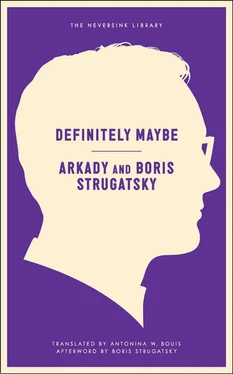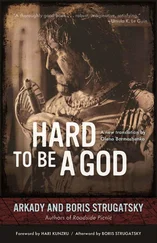And then, reading my mind once more, she said:
“And it’s really not important what you decide. The important thing is that you’re capable of such discoveries. Will you at least tell me what it’s about? Or is that forbidden too?”
“I don’t know,” I said and thought: Is she just trying to console me or does she really feel that way; is she so terrified that she’s trying to talk me into capitulating; is she merely trying to sweeten the pill that she knows I’ll have to swallow? Or is she trying to get me to fight, is she getting my dander up?
“The pigs,” she said softly. “But they won’t break us up. Right? That, they’ll never do. Right, Dmitri?”
“Of course,” I said and thought: That’s the whole issue, darling. That’s what it’s all about.
The storm was abating. The cloud was floating north, exposing a gray, misty sky from which fell a soft, gray rain.
“I brought the rain,” Irina said. “And I was hoping that we could go to Solnechnoe on Saturday.”
“It’s a long way to Saturday,” I said. “But maybe we should go.”
Everything had been said. Now we had to talk about Solnechnoe, bookshelves for Bobchik, and the washing machine, which had conked out again. And we did talk about all that. And there was an illusion of a normal evening, and in order to extend and strengthen that illusion, we decided to have some tea. We opened a fresh pack of Ceylon, rinsed out the teapot with hot water in the most exacting and scientific manner, triumphantly placed the box of Pique Dame candies on the table, and watched the kettle, waiting for the moment of rolling boil. We made the same old jokes and set the table, and I quietly took the order blank from the deli and the note about Lidochka and I. F. Sergeenko’s passport, crumpled them up, and stuffed them into the wastebasket.
And we had a marvelous teatime—it was real tea, an elixir—and talked about everything under the sun, except the most important thing. I kept wondering what Irina was thinking about, because she seemed to have been able to forget the whole nightmare—she told me everything that she thought about it and now had forgotten it with relief, leaving me alone, once again one on one with my decision.
Then she said she had to do the ironing and that I should sit with her and tell her something funny. I started clearing the table and the doorbell rang.
Humming a little tune, I headed for the foyer, giving Irina one quick look (she was very calmly wiping the chairs with a dry rag). Unlocking the door, I remembered my hammer, but it seemed melodramatic to go back for it, and I opened the door.
A very young tall man in a wet raincoat and with wet blond hair handed me a telegram and asked me to sign for it. I took his pencil stub, leaned the receipt against the wall, wrote the date and time at his prompting, signed it, returned the pencil and receipt, thanked him, and closed the door. I knew that it was nothing good. Right there in the foyer, under the harsh 200-watt bulb, I opened the telegram and read it.
It was from my mother-in-law. “BOBCHIK AND I LEAVING TOMORROW MEET FLIGHT 425 BOBCHIK SILENT VIOLATING HOMEOPATHIC UNIVERSE LOVE MAMA.” And a strip of paper was glued on below: “HOMEOPATHIC UNIVERSE STET.” I read and reread the telegram, folded it in four, turned out the light, and went down the hall. Irina was waiting for me, leaning against the bathroom door. I handed her the telegram, said “Mama and Bobchik arrive tomorrow,” and went straight to my desk. Lidochka’s bra was draped across my notes. I put it neatly on the windowsill, gathered my notes, put them in order, and stuck them in my notebook. Then I got a fresh manila envelope, put everything inside, tied it, and, still standing, wrote on the face: “D. Malianov. On the Interaction of Stars and Interstellar Matter in the Galaxy.” I reread it, thought a bit, and blacked out the “D. Malianov.” Then I put the envelope under my arm and left. Irina was still by the bathroom door; the telegram was pressed to her chest. As I walked past, she made a feeble gesture with her hand, either to stop me or to thank me. I said, without looking at her: “I’m going to Vecherovsky’s. I’ll be back soon.”
I went up the stairs slowly, step by step, hitching up the envelope, which kept slipping out from under my arm. For some reason the lights were out on the stairs. It was dim and very quiet, and I could hear through the open windows the water dripping from the roof. On the sixth-floor landing, by the garbage chute, where the lovers had been kissing, I stopped and looked out into the courtyard. The huge tree’s damp leaves glistened black in the night. The yard was empty; the puddles shimmered, rippling in the rain.
I met no one coming down the stairs. But between the seventh and eighth floors a pathetic little man sat hunched up on the steps, with an old-fashioned gray hat next to him. I walked around him carefully and continued on, when he spoke:
“Don’t go up there, Dmitri.”
I stopped and looked at him. It was Glukhov.
“Don’t go up there now,” he repeated. “Don’t!”
He got up, picked up his hat, straightened slowly, holding his back, and I saw that his face was smeared with something black—dirt or soot—his glasses were askew, and his lips were compressed tightly, as though he were in real pain. He fixed his glasses and spoke, barely moving his lips:
“Another envelope. White. Another flag of surrender.”
I said nothing. He hit his hat against his knee, shaking off the dust, and then tried to clean it with his sleeve. He was silent too, but he didn’t leave. I waited to see what he would say.
“You see,” he said finally, “it’s always unpleasant to capitulate. In the last century, they say, people shot themselves rather than capitulate. Not because they were afraid of torture or concentration camps, and not because they were afraid they’d crack under torture, but because they were ashamed.”
“That happens in our century, too,” I said. “And not so rarely.”
“Yes, of course,” he agreed. “Of course. It’s very unpleasant for a person to realize that he’s not at all what he thought he was. He wants to remain the way he was all his life, and that’s impossible if he capitulates. And so he has to… And yet there’s still a difference. In our century people shoot themselves because they’re ashamed before others—society, friends… In the last century people shot themselves because they were ashamed before themselves. You see, for some reason, in our century, everybody thinks that a person can always come to terms with himself. It’s probably true. I don’t know why. I don’t know what’s going on here. Maybe it’s because the world has become more complicated? Maybe it’s because now there are so many other concepts besides pride and honor that can be used to convince people.”
He looked at me expectantly, and I shrugged.
“I don’t know. Maybe.”
“I don’t know, either. You would think I was an experienced capitulator, I’ve been thinking about it for so long, about nothing else, and I’ve come up with so many convincing arguments. You think that you’ve come to terms with it, you’ve calmed down, and then it starts up again. Of course there’s a difference between the nineteenth and twentieth centuries. But a wound is a wound. It heals, disappears, and you forget all about it, then the weather changes, and it hurts. That’s the way it’s always been, in all centuries.”
“I understand,” I said. “I understand it all. But a wound is a wound. And sometimes another person’s wound is much more painful.”
“Dear God!” he whispered. “I’m not trying to… I would never dare. I’m just talking. Please don’t think that I’m trying to talk you out of it, that I’m giving you any advice. Who am I? You know, I keep thinking, what are we? I mean people like us? We’re either very well brought up by our times and our country or else we’re throwbacks, troglodytes. Why do we suffer so much? I can’t figure it out.”
Читать дальше












